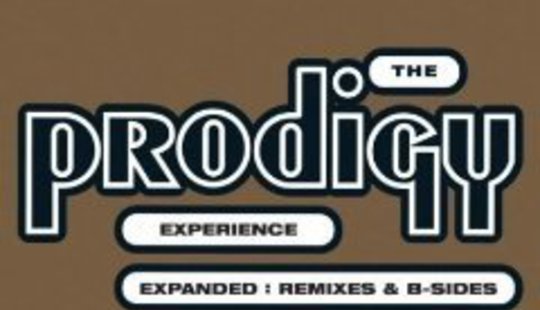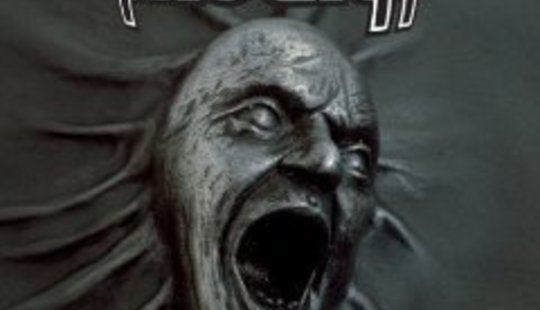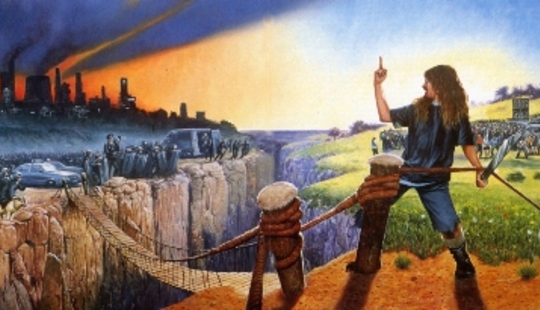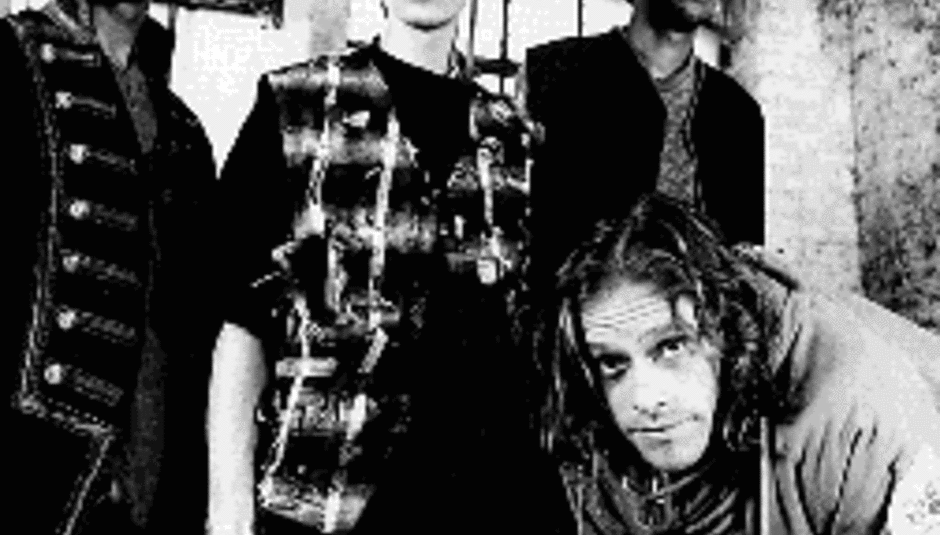Pop will eat itself? We’re already there.
We’ve come full circle, sort of: Pendulum and Crystal Castles are just two acts making music in 2008 that echoes the early days of rave culture in the UK; its blaring sirens, basic beats, uplifting euphoria; its air of togetherness, of a united front for a common goal, the pursuit of fun. As the indie of 2008 looks backwards to move forwards, assimilating the best of ‘80s pop for its own devices – see: Mystery Jets and Late Of The Pier aping Haircut 100 and Gary Numan respectively, and many more – so dance, too, takes a lengthy glance over its shoulder. Dubstep might be firing up the dancefloors of the cognoscente’s minds, thanks to Mercury nods and Guardian features, but the charts resonate with deafening echoes of rave. From Basshunter to Cascada, these Euro-pop/dance conquerors of singles countdowns the continent over can trace their roots back to the source: the early ‘90s, a field in the middle of nowhere, thousands of people losing their shit.
Video: The Prodigy, 'Wind It Up'
- - -
The importance of The Prodigy can’t be understated; their importance in the development of dance music – the genre at its widest descriptive – mustn’t be overwritten by muso preachers promoting the virtues of jungle, techno, house, trance, whatever as the pivotal mutation, the quintessential evolution that triggered the mainstream explosion of what was, once, a purely under-the-radar phenomenon. Orbital can take some of the credit (fuck Urban Hype and their pan-flash ilk), but it was Liam Howlett’s Braintree-based outfit – formed a year later than the Hartnoll brothers’ band – that made the album that entranced audiences far younger than those gathering at illegal events held in remote valleys and the middle of copses the cops couldn’t reach.
 I was young when Experience (pictured with its ‘expanded’ cover) came out in 1992, but old enough to have already begun collecting copied-from-a-copy versions of albums by Soundgarden, Nirvana, R.E.M., alongside a smattering of singles and cassettes – American rock, basically, was what I was about. Yet I found Experience fascinating despite my blossoming reluctance to accept anything else but guitar music as ‘proper’ music. A friend of mine would put it on in his tiny bedroom – his house was sort of on the way home from school, via a pretty lengthy detour – and we’d happily soak in its ballistic beats and child-pleasing vocal samples. It all seemed so simple, like music made for a computer game (I must’ve been onto an Amiga by then); but it stuck like glue to the synapses, trickling into the brain’s crevices as I imagine the drugs its older admirers took would have done, to the sound of thump, thump, thump.
I was young when Experience (pictured with its ‘expanded’ cover) came out in 1992, but old enough to have already begun collecting copied-from-a-copy versions of albums by Soundgarden, Nirvana, R.E.M., alongside a smattering of singles and cassettes – American rock, basically, was what I was about. Yet I found Experience fascinating despite my blossoming reluctance to accept anything else but guitar music as ‘proper’ music. A friend of mine would put it on in his tiny bedroom – his house was sort of on the way home from school, via a pretty lengthy detour – and we’d happily soak in its ballistic beats and child-pleasing vocal samples. It all seemed so simple, like music made for a computer game (I must’ve been onto an Amiga by then); but it stuck like glue to the synapses, trickling into the brain’s crevices as I imagine the drugs its older admirers took would have done, to the sound of thump, thump, thump.
I particularly enjoyed ‘Wind It Up’ – a simple piano motif and a high-pitched vocal, saying the title over and over, combined with high-energy beats. My friend must’ve had the single version, too, ‘Wind It Up (Rewound)’, because I recall clearly hearing ‘We Are The Ruffest’, a b-side that would rattle about my brain as I played lunch-time football on the school field. It was like nothing I’d heard – aggressive, alien, entrancingly weird yet absolutely in tune with the sense of pre/early-teen rebellion I was, like most kids my age, beginning to feel: that sense that mum and dad, but particularly dad with his old Pink Floyd and Led Zeppelin records (oh, how one’s opinions change with age), knew nothing of culture that was of any relevance to what I thought was the cutting edge of modernity. If I saw me at that age, now, I’d slap myself.
Video: The Prodigy, 'Charley'
- - -
Both non-album proper tracks outlined above appear on the new, expanded edition of Experience; so too do ‘Charley’ (the Alley Cat Remix version that broke into the top three in 1991), the 12” Fairground Remix of ‘Everybody In The Place’, and a telling live take on crowd favourite ‘Out of Space’, recorded at Pukkelpop in 2005. Originally released in 1992, the Lee ‘Scratch’ Perry sampling single receives the sort of reception from the Belgian crowd that should, really, be reserved for impossible revivals of the long dead (appropriate?). The set-closing sing-along is epic; the song may have aged, but the love for it has, clearly, only grown and grown. None of the ridiculous ramblings of band MC Keith ‘Maxim’ Palmer can distract from its enduring popularity.
 Two years after Experience, Music For The Jilted Generation arrived (pictured with its ‘expanded’ cover); subsequently, teenagers the country over went into meltdown. Well, they did at my school, anyway. Well, the eight or nine pupils who, like, me, thought music was the only art form in the world that really mattered did. Here, The Prodigy mutated: they became a band. Rock kids could get into them through singles like ‘Poison’ and ‘Voodoo People’ – the latter featured a remix from The Chemical Brothers when they were still known as The Dust Brothers, before the whole cross-Atlantic hoo-ha about who came first (the Americans, as it happened). It also appeared to rip the opening riff from Nirvana’s ‘Very Ape’ – another neat trick to ensnare the rockers yet to be won over – although scanning the credits reveals no official recognition of this. A new audience was opening up for the foursome.
Two years after Experience, Music For The Jilted Generation arrived (pictured with its ‘expanded’ cover); subsequently, teenagers the country over went into meltdown. Well, they did at my school, anyway. Well, the eight or nine pupils who, like, me, thought music was the only art form in the world that really mattered did. Here, The Prodigy mutated: they became a band. Rock kids could get into them through singles like ‘Poison’ and ‘Voodoo People’ – the latter featured a remix from The Chemical Brothers when they were still known as The Dust Brothers, before the whole cross-Atlantic hoo-ha about who came first (the Americans, as it happened). It also appeared to rip the opening riff from Nirvana’s ‘Very Ape’ – another neat trick to ensnare the rockers yet to be won over – although scanning the credits reveals no official recognition of this. A new audience was opening up for the foursome.
As Music… worked its magic – it went to the top of the albums chart – so rave became The Enemy: 1994’s Criminal Justice and Public Order Act described rave music – that which played at the illegal gatherings still happening the length and breadth of the UK – as: “music [including] sounds wholly or predominantly characterised by the emission of a succession of repetitive beats”. Accurate enough for some, but the government wasn’t playing critic for kicks: police were given the power to stop a rave when a hundred or more people were present, or when only two people were seemingly planning to start a rave. Worse still, a section of the act allowed police to turn those who they thought might be on their way to a rave around, preventing them access to their destination.
The Criminal Justice and Public Order Act of ’94 may have had some positives in the long term – that’s not something for this writer to get into as I was far too young to ever attend one – but its effect on rave culture was great, and felt at the highest level, i.e. by The Prodigy. Music… begins with a voice: “So, I’ve decided to take my work back underground… to stop it falling into the wrong hands”. Then there’s the artwork – not the front cover, perhaps representing a fallen raver captured in Star Wars carbonite, but its inside art. Fold out the booklet and what do you have? This:

Yes, it’s faintly comical – the hippie with his massive machete, looking to cut the coppers off from spoiling his blissful rave, flipping the shielded riot police the bird as he makes with the hacking. The bleak city one side, the decay and gloom; on the other, rolling green, good times, rave. The picture’s mocked in John Niven’s Kill Your Friends, sort of – upon hearing of a colleague’s appreciation of the image, i.e. he really likes it, our evil-minded protagonist proceeds to pound said admirer’s skull in with a baseball bat. Sorry, should have popped a ‘warning: spoiler’ in there. It’s funny, but not exclusively ‘ha ha’ so; its message at the time was clear and focused, and absolutely meant. But the passing of time has dulled its bite, the kids of today more likely to stay in their bedrooms and download the latest tracks illegally rather than gather in a field to hear them – nowadays the illegal coming together of individuals to listen to “a succession of repetitive beats” takes place in a virtual Eden. There’s no rope bridge – just a password, if you’re lucky, and daddy’s account to abuse.
Video: The Prodigy, 'Voodoo People'
- - -
Music… itself doesn’t seem to have dated as much as Experience; in its tracks lie trace elements of what would be part of the foundations of nu-metal – ‘Their Law’ (featuring Pop Will Eat Itself) is a rapper away from beating Hed PE at their own (limited) game – and there’re moments of ethereal sublimity to be found in the three-track ‘Narcotic Suite’ that closes the album. ‘Full Throttle’ can still sound incredible on a dancefloor – which it’ll fill with ease – and those singles – ‘Poison’, ‘Voodoo People’, ‘No Good (Start The Dance)’ – do sound as vibrant today as they did at the time to these ears. Perhaps nostalgia’s playing tricks, but honestly: there’s little in Music… that couldn’t get past today’s strict censors of taste.
As with Experience, Music… is expanded here: included are two alternative versions of ‘Voodoo People’, a spread of b-sides and another live track from Pukkelpop (the year isn’t given, but let’s assume 2005, too), ‘Their Law’. Unlike Experience, though, the extras here don’t add to the… um… experience, and if you’re already in possession of The Prodigy’s second long-player, there’s no real need to shell out those pennies all over again for this special edition.
But Experience? If you’re after reliving moments in your life you’d figured were long forgotten, get on it, so to speak. If you’re my age it’ll take you back to school days (daze?) and friends’ bedrooms when you’d otherwise be watching Grange Hill; if you were lucky enough to be part of rave culture at its zenith you’ll undoubtedly be inundated with the sort of flashbacks that only a person who has ingested the chemicals you have could ever enjoy. I missed the pills, the dirt, the sound systems, the after-hours creeping to some X-marks-the-spot soiree; but I remember the adrenaline, the taste, the buzz of a different, simpler nature. I recall the heat, the energy, the experience of drifting out of space.
And I wonder: who, 16-or-so years from now, will be writing this many words on the historical significance of Pendulum or Crystal Castles? Pop picks only the sweetest fruit, after all, for placement in the annals of its progress. What’s that? Keef who?
Video: The Prodigy, 'No Good (Start The Dance)'
- - -
Both expanded editions are available now via XL; find The Prodigy on MySpace here.
















